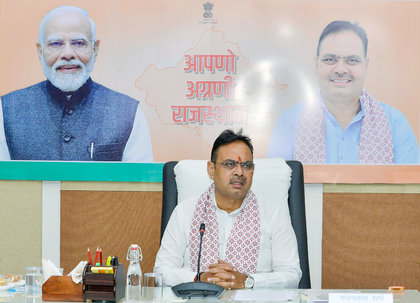Raj CM seeks digital elevation model of downstream Sutlej, Beas in 32nd meeting of Northern Zonal Council
By IANS | Updated: November 17, 2025 19:25 IST2025-11-17T19:24:38+5:302025-11-17T19:25:06+5:30
Jaipur, Nov 17 Rajasthan Chief Minister Bhajan Lal Sharma said on Monday that under the guidance of Union ...

Raj CM seeks digital elevation model of downstream Sutlej, Beas in 32nd meeting of Northern Zonal Council
Jaipur, Nov 17 Rajasthan Chief Minister Bhajan Lal Sharma said on Monday that under the guidance of Union Home and Cooperation Minister Amit Shah, rapid progress has been made in the state over the past two years to strengthen all essential services — law and order, health, education, electricity, drinking water, infrastructure, and cooperatives.
He said that through the Northern Zonal Council, all states will work together towards achieving the vision of a Developed India by 2047.
Addressing the 32nd meeting of the Northern Zonal Council in Faridabad on Monday, chaired by Amit Shah, the Rajasthan Chief Minister expressed gratitude to the Central Government for expanding the Bhakra Beas Management Board from two to four full-time members — an important move that has significantly benefited Rajasthan.
He further urged the Centre to approve three crucial measures: Creating a digital elevation model of downstream Sutlej and Beas to ensure Pong Dam reaches 1,400 feet capacity, allocating surplus water from the under-construction Makora Pattan barrage in line with the 1981 agreement, and sharing electricity generated by Punjab’s small hydro plants on the Bhakra Main Line.
Sharma said that the government is providing daytime electricity in 22 districts in line with its commitment to supply daytime power to farmers. Rajasthan ranks first in the country in installed solar power generation capacity.
Under Component A and C of the PM-KUSUM Yojana, decentralised solar plants with a capacity of 2,215 MW have been installed. He added that 151 new 33 kV substations have been completed under RDSS, and 1.1 million smart meters have been installed.
Through sustained efforts, AT&C losses have been reduced from 21.81 per cent (2023–24) to 15.27 per cent (2024–25).
Sharma also said that the state government is continuously working to strengthen law and order and with an increase in police mobile units, the average response time has reduced from 21 minutes to nearly 13 minutes.
The average disposal time for POCSO Act cases has decreased to 58 days, and for rape cases to 48 days.
He urged the Central Government to approve 15 new fast-track special courts for speedy disposal of POCSO cases.
Under the AMRUT scheme, GIS-based master plans for 28 cities with populations over 100,000 have been prepared.
GIS-based master plans for 62 additional cities with populations between 50,000 and 100,000 are also underway.
Sharma further said that 88 per cent of Rajasthan’s population is covered under health insurance — the highest in the country.
Under the Chief Minister’s AMRUT Aahar Yojana, children aged 3–6 years receive milk five days a week at Anganwadi centres.
Enhanced benefits under the PM Matru Vandana Yojana, free monthly sonography for pregnant women under the Maa Voucher Scheme, and support to 550,000 girls under the Lado Incentive Scheme are helping ensure the comprehensive development of women.
He highlighted that under the leadership of HM Shah, Rajasthan has achieved first place in India in obtaining membership of the Indian Seed Cooperative Society.
Under the world’s largest food storage scheme, the state has completed the construction of 70 warehouses (500 MT capacity each) in the first phase — a national record.
Further achievements include, 5,732 PACS made fully functional, 2,657 new multipurpose PACS formed, 1,958 multipurpose dairy cooperative societies established, 4,141 PACS converted into PM Kisan Samriddhi Kendras and there is an Implementation of a new cooperative code.
Under the Give Up Campaign, around 4.5 million eligible individuals voluntarily renounced their NFSA benefits.
Additionally, the names of 2.7 million individuals were removed for failing to complete e-KYC. As a result, 7 million genuine beneficiaries are now receiving benefits.
For environmental conservation, the state has granted 122 Stage-1 clearances under the Parivesh 2.0 portal in the last two years, and 137 clearances in 2025 alone.
Rajasthan’s cement plants have used 41,000 MT of RDF transported from Delhi over the past 18 months as an alternative fuel.
Disclaimer: This post has been auto-published from an agency feed without any modifications to the text and has not been reviewed by an editor
Open in app